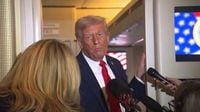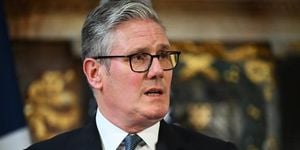On Monday, September 22, 2025, the White House became the stage for a highly anticipated—and controversial—announcement from President Donald Trump regarding children’s health and the nation’s ongoing struggle with rising autism rates. The day began with White House press secretary Karoline Leavitt holding a scheduled briefing at 1 p.m. ET, setting the tone for what would become a headline-grabbing afternoon. By 4 p.m. ET, all eyes turned to President Trump as he prepared to unveil what the administration described as "historic progress" on his campaign pledge to address America’s increasing rate of autism, according to ABC News.
The anticipation was palpable—not just among parents, advocates, and medical professionals, but also within the political and pharmaceutical worlds. The White House’s advance characterization of the announcement as "historic" fueled speculation and concern. Would this be a breakthrough in autism research, a new federal initiative, or something more contentious?
As the hour arrived, President Trump took to the podium and launched into a wide-ranging—and, at times, surreal—critique of childhood vaccination practices in the United States. According to the reporting from the Washington Post and ABC News, Trump voiced skepticism about the size and content of vaccines administered to children, drawing a striking comparison: "Children are being injected with massive vaccines, like the ones you’d give to a horse." He continued, "Vaccines can be great unless you put the wrong stuff in them." The comments, while echoing sentiments Trump has expressed before, took on heightened significance given the context of the day’s announcement.
But the real shock came when Trump, referencing Health and Human Services Secretary Robert F. Kennedy Jr.—a noted vaccine skeptic—hinted that an answer to the autism epidemic had been found. "Secretary Kennedy has found an answer to autism," Trump declared, setting the stage for what would soon dominate headlines.
According to the Washington Post, the Trump administration was preparing to link acetaminophen, the active ingredient in Tylenol, to autism. This over-the-counter pain reliever, found in countless medicine cabinets across the country, has long been considered a safe option for both adults and children. Yet, as officials briefed the press, it became clear that the administration’s position had shifted dramatically. The planned warning: pregnant women should avoid Tylenol unless they have a fever.
The move was described by officials as a response to "historic progress"—a phrase that, for many, belied the contentious scientific debate surrounding acetaminophen’s safety. As one official explained to ABC News, "The president will announce historic progress on his pledge to address America’s rising rate of autism." While the administration framed the announcement as a triumph in the fight against autism, the decision to single out Tylenol sparked immediate controversy.
Tylenol, manufactured by Johnson & Johnson, is one of the world’s most common over-the-counter medications. It is routinely recommended by doctors for pain relief and fever reduction, especially for pregnant women who are advised to avoid other medications such as ibuprofen. The prospect of a federal warning against its use during pregnancy—unless absolutely necessary—sent shockwaves through the medical community and the pharmaceutical industry alike.
As reported by Bloomberg, boxes of Tylenol line the shelves of pharmacies across America, a testament to its ubiquity and trusted status. The idea that this household staple could be linked, even tentatively, to autism was met with confusion and alarm. For many, the Trump administration’s announcement raised more questions than answers. What evidence supported the claim? How would this affect pregnant women seeking safe pain relief? And what would be the broader implications for public health messaging?
During the press conference, Trump’s remarks about vaccines—"Vaccines can be great unless you put the wrong stuff in them"—echoed the skepticism that has characterized much of his administration’s approach to public health. By invoking Secretary Kennedy, a figure known for his criticism of vaccine safety, Trump signaled a willingness to challenge established medical consensus. The implication that Kennedy had "found an answer to autism" suggested a dramatic shift in federal policy, one that would prioritize alternative theories over the prevailing scientific view.
Officials were quick to clarify that the warning was targeted specifically at pregnant women, urging them to avoid Tylenol unless they had a fever. According to the Washington Post, "Officials plan to warn pregnant women against using the medication, one of the world’s most common, over-the-counter pain relievers, unless they have a fever." The specificity of the warning did little to quell the broader anxiety, however, as parents, doctors, and advocacy groups scrambled to interpret the administration’s message.
Reaction from the medical community was swift and, in many cases, critical. While the White House touted "historic progress," many experts pointed out that the scientific evidence linking acetaminophen to autism remains inconclusive. Decades of research have failed to establish a definitive causal relationship between the two, and leading health organizations continue to recommend acetaminophen as a safe option for pain and fever management during pregnancy—when used as directed.
For families affected by autism, the announcement was both tantalizing and troubling. On the one hand, the prospect of a breakthrough in understanding the causes of autism offered hope. On the other, the focus on Tylenol risked shifting attention away from the complex, multifactorial nature of autism spectrum disorders. As one parent remarked privately, "We’re desperate for answers, but we need real science, not scapegoats."
The political ramifications were equally complex. Trump’s decision to spotlight vaccine skepticism and alternative theories about autism played well with segments of his base that distrust mainstream medical institutions. Yet, for many Americans, the move raised concerns about the politicization of science and the potential for confusion among expectant mothers.
As the dust settled, it became clear that the Trump administration’s announcement had succeeded in one respect: it had reignited a national debate about autism, public health, and the role of government in shaping medical advice. Whether the warning against Tylenol would endure, or whether it would be challenged by subsequent administrations and medical authorities, remained to be seen.
For now, the only certainty was uncertainty. The White House’s "historic" declaration had thrust a familiar medication into the spotlight, raising questions that would not be easily answered. In the days and weeks ahead, Americans would be left to weigh the risks, consult their doctors, and—perhaps most importantly—demand clarity from those in power.




